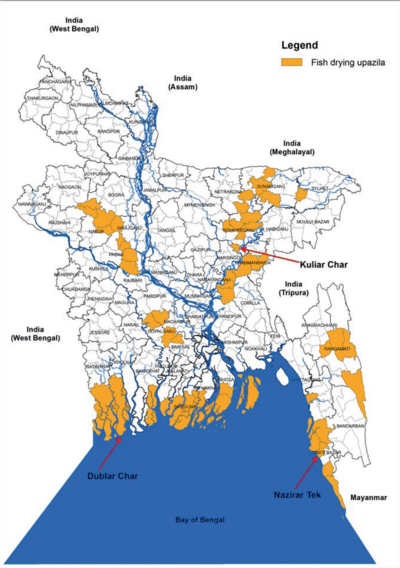About "Dried Fish Matters"
For many of the most vulnerable peoples of the South and Southeast Asia region, dried fish is of vital nutritional, economic, social, and cultural importance.
Despite this, the diverse and complex economy that produces and distributes dried fish, and the threats to it, are all but invisible in research and policy.
The Dried Fish Matters project brings an interdisciplinary team to address this major oversight.
The scale and significance of dried fish production, trade and consumption is rarely acknowledged and poorly understood … in part because of a tendency for fisheries research to focus on fishers, thereby overlooking actors and processes in mid- and downstream value chain segments. —Ben Belton, Mostafa A.R. Hossain, and Shakuntala H. Thilsted
The project director, and other key members of the project team, have been major contributors to the small but growing literature on the dried fish economy of South and Southeast Asia.
That research has shown the historical, social and economic importance of dried fish.
It has also highlighted urgent threats: ecological changes, industrial competition, and problems such as contamination and labour exploitation.
The research also shows that the understanding of how the dried fish economy works has many gaps, particularly with regard to its social, historical, and cultural dimensions.
Goal
The project’s goal is to bring together a diverse team of researchers and practitioners who are expert on fish, food security, and livelihoods in South and Southeast Asia.
The partnership will generate the first comparative and richly detailed study of the regional dried fish economy.
This transdisciplinary effort will identify the overall contribution of dried fish to the food and nutrition security and livelihoods of the poor, and examine how production, exchange and consumption of dried fish may be improved to enhance the well-being of marginalized groups and actors in the dried fish economy.
Objectives
The specific objectives of the research are as follows:
- To produce a benchmark regional understanding of the Indian Ocean dried fish economy, with attention to historical, social, cultural, economic, and policy variability.
- To conduct fine-grained studies of the structure, operation, and dynamics of each segment of the dried fish value chain in selected sites across South and Southeast Asia, including the gender division of labor and differential benefits and costs to men, women, and children.
- To assess contribution of dried fish to the food and nutrition security of urban and rural populations, including the poor.
- To identify and promote priority policy recommendations and development interventions to enhance the food and nutrition security, food safety, and sustainable and socially just livelihoods of poor populations to relevant state agencies and civil society organizations.
The project will address these objectives in a three activity phases: 1) it will establish a baseline regional understanding and identify gaps through innovative analysis of existing data sets, scoping research, and a regional survey; 2) it will fill those gaps through targeted qualitative studies, pilot testing of development interventions, and a second follow-up survey; and 3) it will generate major knowledge synthesis outputs.
Methods
The project integrates different kinds of data, and gathers data from actors in all segments of South and Southeast Asian dried fish value chains including producers, consumers, and managers.
Data will be analyzed using standard software tools like SAS, ArcGIS, and Atlas.ti.
Dried Fish Matters will generate the first regional-scale, diversity sensitive, economic geography of the dried fish economy of South and Southeast Asia and the first international partnership on the topic.
It will develop novel theory and methodology and share knowledge widely.
It will undertake innovative local-level collaborative research projects and pilot studies involving government and civil society actors.
The project will identify key areas for policy intervention to strengthen the dried fish economy.

